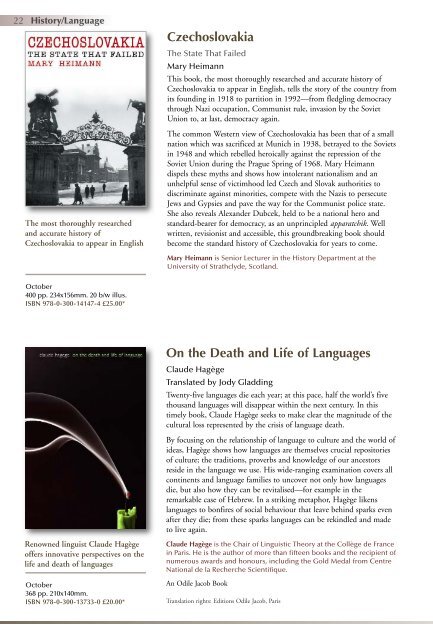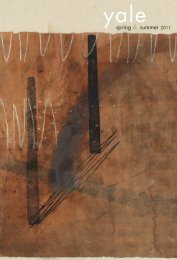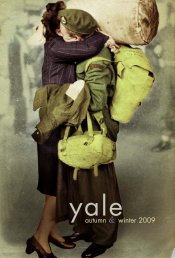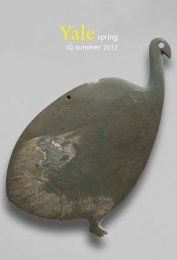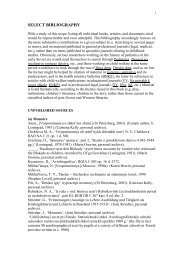22 History/LanguageThe most thoroughly researchedand accurate history ofCzechoslovakia to appear in EnglishCzechoslovakiaThe State That FailedMary HeimannThis book, the most thoroughly researched and accurate history ofCzechoslovakia to appear in English, tells the story of the country fromits founding in 1918 to partition in 1992—from fledgling democracythrough Nazi occupation, Communist rule, invasion by the SovietUnion to, at last, democracy again.The common Western view of Czechoslovakia has been that of a smallnation which was sacrificed at Munich in 1938, betrayed to the Sovietsin 1948 and which rebelled heroically against the repression of theSoviet Union during the Prague Spring of 1968. Mary Heimanndispels these myths and shows how intolerant nationalism and anunhelpful sense of victimhood led Czech and Slovak authorities todiscriminate against minorities, compete with the Nazis to persecuteJews and Gypsies and pave the way for the Communist police state.She also reveals Alexander Dubcek, held to be a national hero andstandard-bearer for democracy, as an unprincipled apparatchik. Wellwritten, revisionist and accessible, this groundbreaking book shouldbecome the standard history of Czechoslovakia for years to come.Mary Heimann is Senior Lecturer in the History Department at the<strong>University</strong> of Strathclyde, Scotland.October400 pp. 234x156mm. 20 b/w illus.ISBN 978-0-300-14147-4 £25.00*Renowned linguist Claude Hagègeoffers innovative perspectives on thelife and death of languagesOctober368 pp. 210x140mm.ISBN 978-0-300-13733-0 £20.00*On the Death and Life of LanguagesClaude HagègeTranslated by Jody GladdingTwenty-five languages die each year; at this pace, half the world’s fivethousand languages will disappear within the next century. In thistimely book, Claude Hagège seeks to make clear the magnitude of thecultural loss represented by the crisis of language death.By focusing on the relationship of language to culture and the world ofideas, Hagège shows how languages are themselves crucial repositoriesof culture; the traditions, proverbs and knowledge of our ancestorsreside in the language we use. His wide-ranging examination covers allcontinents and language families to uncover not only how languagesdie, but also how they can be revitalised—for example in theremarkable case of Hebrew. In a striking metaphor, Hagège likenslanguages to bonfires of social behaviour that leave behind sparks evenafter they die; from these sparks languages can be rekindled and madeto live again.Claude Hagège is the Chair of Linguistic Theory at the Collège de Francein Paris. He is the author of more than fifteen books and the recipient ofnumerous awards and honours, including the Gold Medal from CentreNational de la Recherche Scientifique.An Odile Jacob BookTranslation rights: Editions Odile Jacob, Paris
A Portrait of the BrainPaperbacksAdam ZemanAdam Zeman tells the stories of patients with a variety of neurological disorders, some familiar(epilepsy, chronic fatigue, stroke, memory loss) and others relatively mysterious (narcolepsy,chronic déjà vu, Creutzfeldt-Jakob disease). Chapter by chapter he reveals the various levels ofthe brain, from the atom to the mind, and explores what happens when workings at each levelgo awry. Zeman requires of his readers no specialist knowledge, yet takes us to the very frontiersof current scientific knowledge and elucidates the workings of the brain in astonishing detail.“this is an excellent introduction to the subject . . . Professor Zeman comes across as the kindof man one would be glad to consult if anything went wrong inside one’s skull.”—Nigel Hawkes, The Times“Zeman weaves case studies of patients together with basic science, history, etymology,classical literature and art to produce an erudite discourse on brain components.”—Sandra Aamodt, Nature“This book is, in short, a remarkable achievement . . . Neurology has found a fine advocatet.” —The Lancet“A fascinating tale about what we do know about the brain, and what happens when it goes wrong . . . [Zeman] comes across as alucid explainer of scientific complexity, but also as a humane medical practitioner.”—Clive Cookson, Financial TimesAdam Zeman is Professor of Cognitive and Behavioral Neurology, Peninsula Medical School, Peninsula College of Medicineand Dentistry. He is the author of Consciousness: A User’s Guide, published by <strong>Yale</strong>.July 256 pp. 198x129mm. 16 b/w illus. Paper ISBN 978-0-300-15831-1 £9.99*Translation rights: Conville and Walsh, London23The Raven KingMatthias Corvinus and the Fate of His Lost LibraryMarcus TannerThis book is the first in English to tell the gripping story of the Matthias Corvinus ofHungary—known as the Raven King—and of the fate of his fabled 2000-volume library.“a fascinating book . . . Tanner has a shrewd sense of character and a vivid eye for detail, andhe succeeds in bringing to life the politics of Matthias’s reign, with all its dynastic in-fightingand geopolitical jockeying for position.”—Noel Malcolm, The Daily Telegraph“A fascinating yet little-known true-life tale that has all the hallmarks of gripping fiction.”—The Independent on SundayMarcus Tanner is a journalist and writer, editor of the Balkan Investigative Reporting Networkand a leader-writer for The Independent. His previous books include Croatia, Ireland’s HolyWars and The Last of the Celts, all published by <strong>Yale</strong>.September 288 pp. 198x129mm. 16 b/w illus. Paper ISBN 978-0-300-15828-1 £12.99*Translation rights: A.P. Watt Ltd, LondonThe Invention of ScotlandMyth and HistoryHugh Trevor-RoperThis book, now in paperback, is a characteristically robust and controversial account of Scottishmyth and history by the late Hugh Trevor-Roper, one of Britain’s greatest historians. Writtenwith characteristic elegance, lucidity and wit, and containing defiant and challenging opinions,it will absorb and provoke Scottish readers and intrigue many others.“This work, more or less completed almost 30 years ago and now published for the first timereminds us of (Hugh Trevor-Roper’s) talent . . . [A] vastly entertaining and highly intelligentbook.”—Simon Heffer, The Daily Telegraph“a stunning piece of detective work”—Colin Kidd, London Review BooksHugh Trevor-Roper (Lord Dacre of Glanton) was Regius Professor of History at the <strong>University</strong>of Oxford and a prolific scholar. His last book, Europe’s Physician: The Various Life of SirTheodore de Mayerne, was published by <strong>Yale</strong> in 2006.September 304 pp. 216x138mm. 12 b/w illus. Paper ISBN 978-0-300-15829-8 £9.99*


